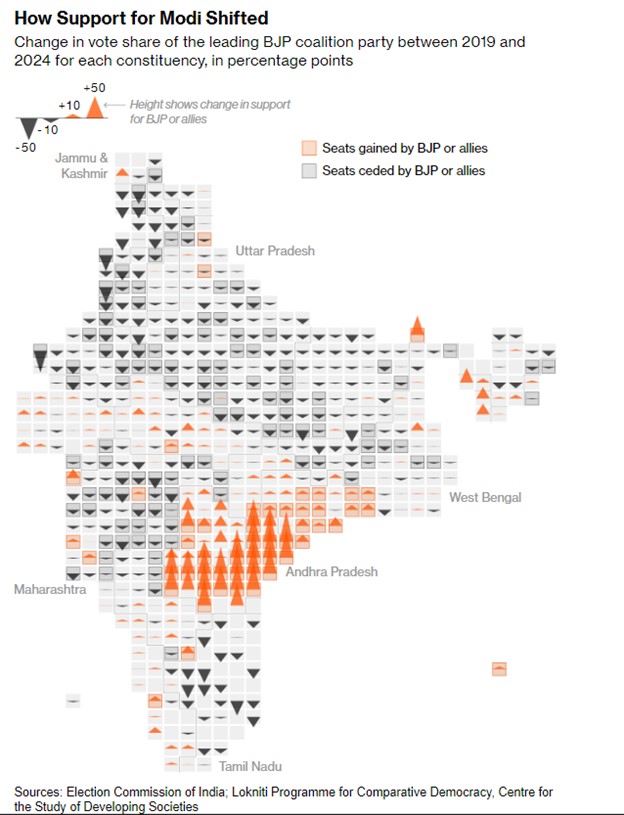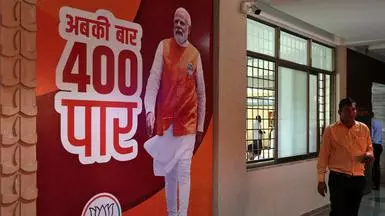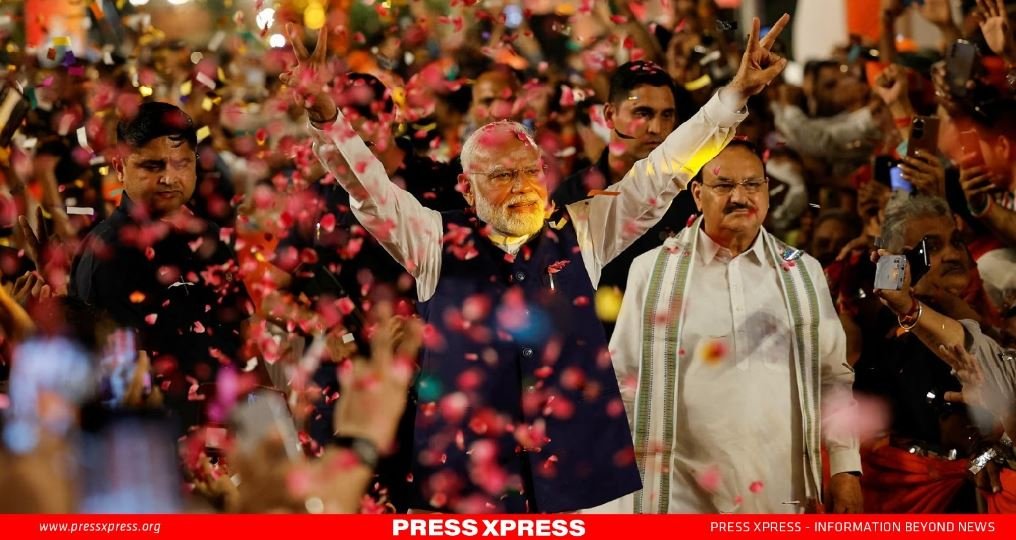India’s Prime Minister Narendra Modi secured an unprecedented third consecutive term after his party’s victory in the nation’s general elections. However, contrary to projections, Modi’s ruling coalition fell short of securing a resounding majority in the parliament.
However, Modi vowed to form the government and said he would continue the “good work” of the last decade.
What Happened in the Indian Election?
Modi’s Bharatiya Janata Party (BJP) won 240 seats on its own in the general election, 32 short of the halfway mark in the 543-member decision-making lower house, and BJP-led NDA bagged 291 seats, according to official results announced late on Tuesday.

Defying expectations, the opposition INDIA alliance led by Rahul Gandhi secured 230 seats, exceeding forecasts. The Indian National Congress party alone won 99 seats, nearly doubling its 2019 tally of 52 in a surprising surge that is anticipated to bolster Gandhi’s stature. With this performance, Congress is poised to assume the role of the Leader of the Opposition in the Lok Sabha, potentially enabling it to exert influence over some regional allies like the Trinamool Congress (TMC).
‘A moral defeat’
Modi’s victory margin in his constituency of Varanasi, a revered Hindu city, shrank from nearly 500,000 votes in 2019 to just over 150,000 this time.
Leader of the opposition INDIA alliance and Centrist Congress party, Rahul Gandhi, said the election sent a clear message.
“The country has unanimously and clearly stated, we do not want Narendra Modi and [Indian Home Minister] Amit Shah to be involved in the running of this country, we do not like the way they have run this country,” Gandhi told reporters. “That is a huge message. “BJP has failed to win a big majority on its own. It’s a moral defeat for them,” he told reporters.
Opposition Upbeat
With a smaller mandate, Modi will need to rely more on allies like N. Chandrababu Naidu in Andhra Pradesh and Nitish Kumar in Bihar for support, unlike previously. Their parties have agreed to endorse Modi as PM.
Despite losing, the opposition Indian National Congress appeared upbeat, with supporters praising Rahul Gandhi. He stated the poor have “defended the constitution,” viewing the results as a message from the people.
The verdict marks a surprising revival for the Congress-led INDIA alliance, defying predictions of decline. It’s a personal setback for Modi, who has dominated Indian politics for a decade securing majorities.
Around 66% of nearly a billion registered voters participated in this massive electoral exercise staggered over seven phases from April 19 to June 1, with some voting in extreme heat nearing 50°C.

Prior to the national election, India’s opposition was largely dismissed as too feeble and fragmented to challenge Prime Minister Narendra Modi and his party. However, they orchestrated a remarkable comeback, slowing the Modi juggernaut and restricting the BJP well below the majority mark. This uncharted territory for the populist prime minister necessitates the support of allies to remain in power, potentially prompting a significant shift in his governance approach after enjoying a commanding parliamentary majority for a decade.

A central question now looms over the formation of the next government: Can Prime Minister Modi rule while dependent on other parties, something he has never done before?
“This is an unknown,” said Neelanjan Sircar from the Center for Policy Research in New Delhi. “Modi has only been known to work as a leader with absolutely centralized power.” “The ‘Modi phenomenon’ is based on a particular form of governance. Him having to compromise with allies is not either a Modi we know, or a Modi he has sold,” Sircar added.
Modi has little choice but to govern with more humility now. For the first time, he will rely on unpredictable regional parties like the Telugu Desam Party (TDP) and Janata Dal (United) to keep his coalition intact, leaving less room for broader ambitions. Reports suggest allies are demanding plum positions and perks to avoid defecting to the opposition, a threat that could hang over Modi’s third term.
“The game will be to keep allies happy and give up ministerial berths, however, ministers do not mean a lot in this government, as we have seen,” said Sircar.
“There is no other option for Modi – if he wants to behave the way he has for the last 10 years, he will have to vacate the office,” said Modi biographer Nilanjan Mukhopadhyay. “Modi will need to come up with a personality that is humble and open to working with others – a side of him we have never seen.”
Within the BJP too, Modi and Amit Shah could face questions over their centralized hold, said Rasheed Kidwai, a political analyst. “The internal fissures will become triggers now – it is not the same India as before June 4. This will change contemporary politics fundamentally.”
Why Modi’s Party Lost its Majority
Modi will remain in power but with a substantially reduced mandate, defying forecasts of a resounding victory. His supporters cite factors like stable governance, continuity appeal, welfare schemes, and enhancing India’s global image for his third term. However, the BJP’s seat drop may be linked to joblessness, inflation, inequality, and a controversial army recruitment reform. Modi’s divisive campaign, especially targeting Muslims, could also have alienated some voters. His “400 paar” slogan aiming for over 400 NDA seats may have backfired amid fears of constitutional changes.

The BJP faced its biggest setback in Uttar Pradesh (UP), a pivotal state with 80 seats. The INDIA bloc made deep inroads here and in other Hindi heartland states including Rajasthan, Bihar, Haryana, and Jharkhand. The Hindi-speaking belt has 225 seats.
The Samajwadi Party (SP) staged a remarkable turnaround, becoming the third-largest party with 38 MPs, by getting the caste calculus right in ticket distribution, prioritizing non-Yadav OBC and upper caste candidates, attracting voters who had previously supported the BJP.
Another state where the BJP lost ground is Maharashtra after playing a role in the split of regional heavyweights Shiv Sena and NCP.
What Comes Next?
Despite his party losing its majority, Modi has vowed to continue as India’s Prime Minister. India’s parliamentary system allows a party with the most votes to form a coalition government if no single party secures a majority. Modi’s alliance comprises several partners, with varying degrees of allegiance. If he fails to garner enough support to return as PM, allies could demand a different leader or defect to the opposition, potentially questioning the country’s leadership – though such a scenario appears unlikely at present.
For a significant part of India’s post-independence history, coalition governments were common, and such administrations have been credited with notable achievements like the economic liberalization of the early 1990s.
What Does This Mean for India?
Many of the BJP’s alliance partners do not share the party’s core pro-Hindu agenda. This could force the BJP to tone down its harsh rhetoric and set aside ambitions to more aggressively reshape India as an overtly Hindu nation.
It may also compel the BJP to offer cabinet posts and other concessions to allies. On the economic front, while a BJP-led government will likely continue its business-friendly policies, a weakened mandate means it may struggle to enact ambitious reforms around labor and land laws, which economists consider necessary for sustaining growth. To shore up support, a BJP-led administration may be tempted to resort to populist spending measures, putting its fiscal plans at risk.
What Does This Mean for the Rest of the World?
Under Modi’s leadership, India’s global profile has significantly risen, aided by its robust 8%-plus economic growth rate and a young, expanding population that attracts foreign businesses.
While seeking a deeper partnership with the US, which views India as a critical counterweight to China, Modi has maintained strategic independence, refusing to condemn Russia over its invasion of Ukraine or shun its oil exports.
Analysts don’t anticipate these positions to change soon. Similarly, Modi’s ambitions to transform India into a global manufacturing hub and continue luring foreign investors seeking the next growth story as China’s economy slows are expected to persist.


